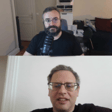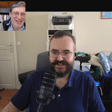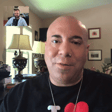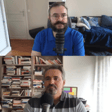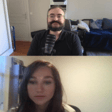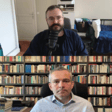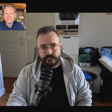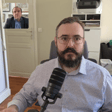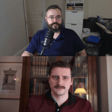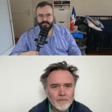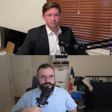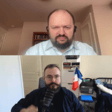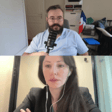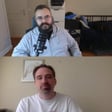Introduction from the 'Supervillain Lair'
00:00:00
Pascal-Emmanuel Gobry
Hello everyone and welcome to a new episode of the Low Production Value Sphere podcast, which is shot from my supervillain lair underneath Fordow Mountain. As you can see, it's very bright because somebody poked holes in the ceiling recently.
00:00:16
Pascal-Emmanuel Gobry
ah I have a very good guest with me this time that I'm very excited to talk to because he is the honestly the smartest and best person I've talked to, I think, ever when it comes to issues of manufacturing and reshoring.
Guest Introduction: Harry Moser and the Reshoring Initiative
00:00:36
Pascal-Emmanuel Gobry
And I'm talking about the great Harry Moser, who is the founder and director of something called the Reshoring Initiative. Harry is a great guy, very smart guy, ah ah bachelor and master's from MIT, back when that meant something. Actually, from MIT, it still does.
00:00:53
Pascal-Emmanuel Gobry
ah And then he used to run like a real American manufacturing company, so he actually worked in the real world.
00:01:01
Pascal-Emmanuel Gobry
ah And then instead of retiring on some island somewhere, he decided to try to actually do something about the decline of American manufacturing.
00:01:12
Pascal-Emmanuel Gobry
And so he started the reshoring initiative. So, Harry, why don't you start by telling us what the reshoring initiative is and what it offers companies, why it's more than just a think tank?
00:01:24
Harry Moser
Yeah, thanks, Pascal. First, it's great, great to be here. And your your your kind words are perhaps a little too much, but I'll do my best to live up to them. The Reshoring Initiative is a nonprofit I founded in 2010.
00:01:38
Harry Moser
And the the mission is to balance the goods trade deficit that last year was $1.2 trillion. dollars And to balance it would take about a 40% increase in US manufacturing. So, a you know, huge, huge challenge.
00:01:53
Harry Moser
The The way we do that, we document the trend. We're the only source of data on the trend. We promote it, articles, podcasts, you know interviews, things like this, like we're doing today. Thank you.
00:02:05
Harry Moser
and And we enable it. So we provide tools that help companies decide to reshore or evaluate whether to reshore, to help them quantify the advantages of of bringing the work back.
00:02:22
Pascal-Emmanuel Gobry
Yeah, and ah the the the tools are great and fascinating, but we already did an interview about that, so I'm going to link it in the comments.
Impact of US Elections and Policies on Reshoring
00:02:30
Pascal-Emmanuel Gobry
ah The reason I wanted to have you on again is because in the time since we last spoke, I don't know if you heard, but there was an election in the U.S.,
00:02:43
Pascal-Emmanuel Gobry
And then a couple of things happened.
00:02:47
Pascal-Emmanuel Gobry
ah So I wanted to have you on to discuss the sort of broad you know ah universe of everything that's happened and with regard to Trump administration, Trump administration policies and reshoring and manufacturing.
00:03:01
Pascal-Emmanuel Gobry
And so I understand that you have a new reshoring survey, which ah talk which is relevant to this and which can help frame our discussion.
00:03:14
Harry Moser
Correct. We we surveyed 500 companies and we got a combination of big companies. I call them OEMs, original equipment manufacturers, think General Motors, but also contract manufacturers. So machine shops, the foundries, the people like that that make the components for the big companies. And so we got the the view of both of them on ah things like tariffs and reshoring and offshoring and you know, what they've done and what it will take to get them to do more.
00:03:44
Harry Moser
So we tried to be very timely in considering what's actually happening in Washington.
Tariffs, CPI, and Uncertainty in Manufacturing
00:03:53
Pascal-Emmanuel Gobry
Okay. And so, I mean, I guess the first question i i want to ask someone like you, who's actually in the real world, which is, what do you hear when you talk to actual manufacturers, people who run the business?
00:04:08
Pascal-Emmanuel Gobry
Are they saying, you know, oh, it's a catastrophe because those tariffs, you know, that they make it impossible to run a business?
00:04:14
Pascal-Emmanuel Gobry
Are they saying, oh, this is amazing. You know, ah we're making things in America again. Are they saying, you know It's difficult in the short term because there's a lot of disruption, but you know we think over the long term things are going to improve. or you know
00:04:30
Pascal-Emmanuel Gobry
what's What's the feeling on the ground for people who are actually in this?
00:04:35
Harry Moser
It certainly makes a difference if you're talking about manufacturers versus, say, retailers. And retailers are obviously concerned because their costs are going to go up. And they may have to change suppliers, all kinds of things like that. For manufacturers, it depends whether the manufacturer is manufacturing here or manufacturing somewhere else and importing.
00:04:55
Harry Moser
OK, so it depends who's ox is being gored, so to speak. But overall, just in general, I'd say most of them, their business is not not bad. It's pretty much OK right now.
00:05:07
Harry Moser
But they're concerned about the uncertainty for the future. You know, those that have tried to be objective and look at what could actually happen with the tariffs, you know, the best estimates say that tariffs would increase the tariffs like they look like they're going to wind up the 10, 15 percent tariffs plus 30, 40 on China, something like that would increase the CPI by maybe one percent or one and a half percent.
00:05:25
Pascal-Emmanuel Gobry
Right.
00:05:32
Harry Moser
And that's You know, it's painful, a little bit painful, but it's not catastrophic.
00:05:38
Pascal-Emmanuel Gobry
Right.
00:05:38
Harry Moser
And so so from my viewpoint, the media and the financial firms overstated the likely impact of tariffs, driving this uncertainty and fear. it was it was They caused as much problems as the as the chaotic nature of the of the implementation of the tariffs did.
00:05:54
Pascal-Emmanuel Gobry
Right.
00:05:56
Harry Moser
And and so And yeah one thing that bothered me is that when you'd get all these articles from top economists from learned, learned, smart, smarter, smarter people than I am and And they they attack the the details, they but but they should have embraced the objective.
00:06:16
Harry Moser
If they had started their articles by saying, it's absolutely necessary that the US brings back its manufacturing, and i and and we're going to argue about the details of how to get it done, but it's absolutely a good job.
00:06:17
Pascal-Emmanuel Gobry
Right.
00:06:20
Pascal-Emmanuel Gobry
Right. right
00:06:27
Harry Moser
good Good job that you're doing this. Let's this discuss how to do it.
00:06:29
Pascal-Emmanuel Gobry
Right.
00:06:30
Harry Moser
then Then I think we would have had a very different emotional climate in the country. And so i I blame the media. this has help A lot of the economists, the association, some of them on on on doing this.
00:06:43
Harry Moser
ah just Just for reference, back in April, I predicted that we'd wind up with 25% to 50% tariffs on China, 10% to 15% on most other countries, somewhat higher on steel and autos, some restrictions on China shipping through other countries.
00:06:57
Harry Moser
So more or less the way it looks like it's probably going to turn out.
00:07:00
Pascal-Emmanuel Gobry
Right.
00:07:02
Pascal-Emmanuel Gobry
Right. OK. So I guess my next question is exactly
Root Causes of the US Trade Deficit
00:07:08
Pascal-Emmanuel Gobry
about this. like What do you think about the tariffs? Because ah last time we spoke, you were sort of moderately pro-tariff. You were like, tariffs are good, but actually it would be better to have a VAT or something like that. so i you know it do do you think the current policy is good? you think it's you know it's too unpredictable right now? do you what's What's your opinion?
00:07:35
Harry Moser
First, as we probably discussed last time, you have to understand the root cause of our trade deficit, which which again is what I'm attacking, what President Trump's attacking.
00:07:42
Pascal-Emmanuel Gobry
Right.
00:07:44
Harry Moser
and And the the root cause is that the U.S. manufacturing cost is consistently too high relative to almost every other country in the world. So it's it's not just China, it's Germany and France and Italy and Spain and, you know,
00:07:54
Pascal-Emmanuel Gobry
Right.
00:08:00
Harry Moser
you know countries that you wouldn't think we'd have a trade deficit with. We've got a trade deficit with nine out of 10 of our largest trading partners, and the only exception being the UK, which saw its better best days 200 years ago or something like that.
00:08:16
Harry Moser
And so the um so so we we say that that that the correct industrial policy and optimal industrial policy would be first skilled workforce. to have the quantity and quality to be more like Germany in terms of the apprenticeships and an apprenticeship system to to look to lower the US dollar.
00:08:34
Harry Moser
the Now, the dollar has already come down about 10 percent from its peak.
00:08:38
Pascal-Emmanuel Gobry
OK.
00:08:39
Harry Moser
okay and And we're starting to see companies say that they're exporting more because they're now more price competitive. So and we expect to start seeing a lot of reassuring cases where companies are reassuring because their domestic production is now more price competitive and prices is the deciding factor.
00:08:59
Pascal-Emmanuel Gobry
okay Okay, so okay so ah ah that's fascinating. So let's ah we'll talk about the the workforce skills thing because it's extremely important, I know.
Industry-specific Reshoring Influences
00:09:12
Pascal-Emmanuel Gobry
But I just want to jump on what you just said. Okay, so some companies are indeed reshoring. a Is there... you know is there um Are you know, is there a standout? Is there a thing in common among those companies? Are they in a particular industry or particular part of the value chain or?
00:09:34
Harry Moser
I understand that the big announcements are the ones you see are the big companies because they get the headlines. And and i've I've got a list of about 40 big projects that you know to typically a billion dollar, two billion dollar or more projects, a thousand people, with a couple of thousand people and that have been announced since April 2nd.
00:09:51
Pascal-Emmanuel Gobry
Right.
00:09:58
Pascal-Emmanuel Gobry
Yeah.
00:09:59
Harry Moser
And and ah yeah In terms of industry, there's a lot of automotive. Some of which saying, well, it looks like we're going to make them in the US instead of Mexico because because of the tariffs on Mexico.
00:10:10
Pascal-Emmanuel Gobry
Right.
00:10:13
Harry Moser
but There's there's a lot of pharma. And I think the pharma is partially partially due to the tariffs on pharma, potential tariffs on pharma.
00:10:17
Pascal-Emmanuel Gobry
Interesting.
00:10:23
Harry Moser
But also, I think they're trying to get on the good side of the administration ah to to avoid or minimize the effect of the balancing of US farmer prices relative to our peer countries.
00:10:36
Harry Moser
You know, fact that we're twice as high as they are.
00:10:37
Pascal-Emmanuel Gobry
Right.
00:10:39
Harry Moser
i think they're they're trying to get some goodwill there. um There's steel, a couple of steel companies, so so a lot of appliance companies. But but the one of the key themes throughout their announcements, you can read it or you can read it between the lines is we're announcing this, but we're not going to start on it until the tariffs firm up and we know what they are, how much they are
Finalizing Tariff Rates and Congressional Approval
00:11:06
Harry Moser
from each country.
00:11:06
Pascal-Emmanuel Gobry
Right. Right.
00:11:07
Harry Moser
Because if you if you're a president of a company and you announce a billion dollar investment, you start digging and you pour money into this hole and then the tariffs go away, you're looking for a job.
00:11:14
Pascal-Emmanuel Gobry
Right.
00:11:18
Harry Moser
yeah okay so so So to me, the the biggest priority for Trump is to firm them up, get them real, settle for 10%, 15%, something in that order.
00:11:34
Harry Moser
Don't drag this on for another three or four months because because all these actions won't happen.
00:11:37
Pascal-Emmanuel Gobry
OK.
00:11:40
Harry Moser
And and he needs he needs those jobs to be starting to get announced to to strengthen his position on on everything else.
00:11:44
Pascal-Emmanuel Gobry
Right.
00:11:47
Pascal-Emmanuel Gobry
Right. OK. So OK, that's a very good or or interesting anyway ah heuristic. It's like better to settle for 10% now and you know it's going to stay in the future than sort of hold out for 15% with lots of disruptions and then sort
00:12:05
Harry Moser
the the The other thing is.
00:12:07
Pascal-Emmanuel Gobry
or Or whatever your number is, but that could be the philosophy.
00:12:09
Harry Moser
Yeah. Now, the other thing, though, is it it shouldn't ideally ideally it should not just be a Trump announcement of a tariff.
00:12:20
Harry Moser
It should be something that he can push through Congress and have Congress vote on and approve so that yeah so so that the the at the mid year elections, if he loses control of the House and the Senate,
00:12:26
Pascal-Emmanuel Gobry
that's, you know.
00:12:33
Harry Moser
that they can't force him to rescind the tariffs or the next president can't reverse them.
00:12:36
Pascal-Emmanuel Gobry
Yep.
00:12:40
Harry Moser
And so you you'd like to get it as tough and firm and as locked in as you can.
00:12:40
Pascal-Emmanuel Gobry
yeah
00:12:44
Harry Moser
And if you do that, then then it'll it'll be the wonderful, beautiful ah tariffs. but
00:12:52
Pascal-Emmanuel Gobry
Yeah, well, I mean, you know, Congress is a different thing, right? they They wanted to put the tariffs in the big, beautiful bill, and they couldn't um because – They don't have the votes in the Senate.
00:13:04
Pascal-Emmanuel Gobry
ah they They probably would in the House, but they don't have them in the Senate. ah But yeah, okay, fair enough. ah Speaking of the big, beautiful bill, ah my my next question about this, so I don't know if you've looked much at it, but it had tax provisions and like a lot of these tax provisions are the consumer side. It's like no taxes and
Corporate Tax Cuts and Investment Boom
00:13:28
Pascal-Emmanuel Gobry
tips, whatever.
00:13:29
Pascal-Emmanuel Gobry
ah Although no tax on overtime might be significant. ah But there's also corporate tax cuts. And in particular, there's accelerated depreciation, including for physical plant.
00:13:41
Pascal-Emmanuel Gobry
ah A lot of the tax wonks that I talk to are super excited about this because they think it's going to, you know, lead to a great investment boom because of course you can write off the entire cost of an investment project on day one instead of amortizing it over the the life of the project.
00:14:04
Pascal-Emmanuel Gobry
ah do you think that Do you think that matters? Do you think it's not going to matter?
00:14:10
Harry Moser
Yeah, i ah i'm I should be.
00:14:10
Pascal-Emmanuel Gobry
i look at your face and I'm not optimistic.
00:14:17
Harry Moser
I've i've been a ah proponent of of immediate expensing, which is what we're talking about.
00:14:22
Pascal-Emmanuel Gobry
Right.
00:14:22
Harry Moser
for 30 years, i when I ran the company machine tool company, i used to when that was offered, it would come in for six months or so, and I'd have the salesman report to me on every order they got that was because of the...
00:14:32
Pascal-Emmanuel Gobry
Right.
00:14:35
Pascal-Emmanuel Gobry
Right.
00:14:36
Harry Moser
exit And I got a lot of data. I fed it back to the Federal Reserve. Other people would call the Federal Reserve, and and the Fed would send them to me as the expert on immediate expensing. and And so I believe in it.
00:14:49
Harry Moser
um But okay, here here's here. And it doesn't cost much because because if you think about what what it is, it's really a loan from the federal government
00:14:55
Pascal-Emmanuel Gobry
Right.
00:15:00
Harry Moser
of the of the taxes that are saved by the immediate expensing for on average, let's say three years.
00:15:08
Pascal-Emmanuel Gobry
Yeah.
00:15:08
Harry Moser
And so it's it's not they're not giving out money. They're loan in effect, they loaning money. And so i somebody asked me about it a couple of days ago and I calculated that at most it was the equivalent of a one percent tax rate reduction or something like that. You know, it's it's it's and it isn't it isn't anywhere near as big as the 21 percent going down to 15 percent kind of thing.
00:15:27
Pascal-Emmanuel Gobry
Right. Yeah.
00:15:27
Harry Moser
So, so, but, but, but it's, it's psychologically impactful, even more than economic.
00:15:28
Pascal-Emmanuel Gobry
Yeah.
00:15:34
Pascal-Emmanuel Gobry
yeah
00:15:36
Harry Moser
And I and I think it works especially well on privately owned companies, did the the supply chain company.
00:15:36
Pascal-Emmanuel Gobry
yeah
00:15:43
Harry Moser
So if you're a, you're machine shop, a foundry, or something like that, 100 people, something like that, you know, 20 million a year, and, and the The accountant comes to you November and says, boss, we're going to pay a lot of taxes this year.
00:15:56
Harry Moser
The owner says, what can we do? Well, you could buy that the equipment, that million dollars worth of equipment you were talking about getting and that you need. Get it. Get it in here. Got to get it in by December 31st and to get it running because because otherwise you can't get there.
00:16:11
Harry Moser
Get the write off this year. So so I think that that psychological effect that says, here's something I can do about my taxes today. what People do stupid things. but it'll drive them to do things earlier than they would have otherwise.
00:16:21
Pascal-Emmanuel Gobry
Right.
00:16:25
Pascal-Emmanuel Gobry
Right. OK. Well, that's good news. ah So the, yeah.
00:16:30
Harry Moser
but let me Let me also add, though, that in terms of the tax bill, um again, i'm I'm a Republican, you know I'm a conservative, and I don't like taxes, but I so i think it should have had carried interest.
00:16:43
Pascal-Emmanuel Gobry
Right.
00:16:44
Harry Moser
And which is which somehow always avoids the cut.
00:16:47
Pascal-Emmanuel Gobry
Yeah, yeah, yeah.
00:16:48
Harry Moser
And they should have increased the rate on incomes over a million dollars a year. And why?
00:16:53
Pascal-Emmanuel Gobry
Right.
00:16:53
Harry Moser
Because I don't make a million. And but, but you know, but if they had done those two things, it would have helped with the deficit.
00:17:00
Pascal-Emmanuel Gobry
That's the definition of high income, right? That's somebody who makes more than you.
00:17:03
Harry Moser
yeah Yeah, but it would have helped with the deficit and that's good.
00:17:07
Pascal-Emmanuel Gobry
Yeah.
00:17:08
Harry Moser
And it would have improved Republicans chances in 2026 because, you know, Democrats, we say, you know, the tax cuts for billionaires, tax cuts for billionaires.
00:17:16
Pascal-Emmanuel Gobry
Yeah.
00:17:17
Harry Moser
can say it 100,000 times. And if Republicans say, hey, we raised the taxes on the people making more than a million dollars a year, bam, it would have undercut that argument completely.
00:17:18
Pascal-Emmanuel Gobry
Yeah.
00:17:25
Pascal-Emmanuel Gobry
Yeah. Yeah. Well, I mean, i you know, ah substantively, I agree with you, um especially on the carried interest. It's ridiculous. It's good politics. Trump said he wanted it in the bill and and it's sort of it and went It disappeared one day.
00:17:41
Pascal-Emmanuel Gobry
It just went poof.
00:17:41
Harry Moser
Ha ha ha ha ha.
00:17:42
Pascal-Emmanuel Gobry
um it's it's the magic of It's the magic of Congress.
00:17:48
Pascal-Emmanuel Gobry
um ah OK, so the next big item, like if you talk to Trump people, people in the administration, and and you ask them, you know what are you doing about
Energy Costs and Policies Affecting Manufacturing
00:18:01
Pascal-Emmanuel Gobry
reshoring? What are you doing about manufacturing? One of the first things they talk about is energy.
00:18:06
Pascal-Emmanuel Gobry
right They say, you know we're going to have this amazing energy renaissance. It's going to lower the cost of energy massively. and you know the the the This is the stat you always hear. It it may not have even be true but because I've never actually seen the source, but I've heard it a million times, which is the biggest cost input to manufacturing after labor is energy.
00:18:29
Pascal-Emmanuel Gobry
And so, you know, the idea is we can't we can't do much about labor, but if we lower the cost of energy dramatically, we make manufacturing more competitive.
00:18:39
Pascal-Emmanuel Gobry
um First of all, do do you agree with the general assessment? And second of all, you know, do you have a view on on the administration's energy policies?
00:18:49
Harry Moser
First, let me parse something you said. You said we can't do much about labor costs. The best way to... The only reason our labor costs are a problem is because our labor cost is higher than in the other countries.
00:19:00
Harry Moser
And the way to bring way to bring our labor costs per hour closer to theirs is to reduce the value of the US dollar by 10 or 20%, which would make our wages closer to theirs in terms of cost.
00:19:00
Pascal-Emmanuel Gobry
Right.
00:19:12
Pascal-Emmanuel Gobry
Right.
00:19:13
Harry Moser
And so it's something you can't you can do about But in in terms of energy, I'll differentiate. I'll dig into a couple of things. First, oil and gas, which is what they're mostly talking about.
00:19:24
Pascal-Emmanuel Gobry
Yeah.
00:19:26
Harry Moser
And and you you can't reduce the price too much.
00:19:26
Pascal-Emmanuel Gobry
Yeah.
00:19:29
Harry Moser
and It's already pretty low for oil and for gas, I think. and And you get it too low and the U.S. drilling becomes uneconomic. And then you put
00:19:38
Pascal-Emmanuel Gobry
Yeah.
00:19:39
Harry Moser
tens of thousands of people out of work because they're not drilling and they're not making equipment and not doing. So I don't think you're going to drive that down enough to make a lot of difference.
00:19:45
Pascal-Emmanuel Gobry
Interesting.
00:19:49
Pascal-Emmanuel Gobry
OK.
00:19:49
Harry Moser
and Plus, the price of oil is fairly uniform worldwide because it's so easy to ship it. So it's very fungible.
00:19:55
Pascal-Emmanuel Gobry
Yep.
00:19:56
Harry Moser
And and so if you got out, if we pumped enough to get the price here down to $40 a barrel or something, well, the price would go down to $40 a barrel in China also or maybe 45 or something.
00:20:08
Pascal-Emmanuel Gobry
Right.
00:20:09
Harry Moser
they so So you haven't helped your competitive situation very much.
00:20:12
Pascal-Emmanuel Gobry
Right.
00:20:12
Harry Moser
So um I think less renewables saves money. So that's good. to me To me, nuclear is the key. And there's been a lot lot of talk on nuclear permitting, big companies investing in nuclear.
00:20:21
Pascal-Emmanuel Gobry
Yeah.
00:20:28
Harry Moser
So helping helping that, permitting that, making that happen, to me, is the key because that will keep our energy, our electricity costs low. And electricity, yeah yeah finally, it turns out,
00:20:37
Pascal-Emmanuel Gobry
Yeah.
00:20:42
Harry Moser
that that energy is only about 1 or 2% of manufacturing cost. Energy as energy, energy as electricity, as heat, as thermal, that kind of thing.
00:20:50
Pascal-Emmanuel Gobry
Right.
00:20:53
Harry Moser
Now, and if you if you think of the natural gas becoming polyethylene, becoming polypropylene, becoming plastic resin, becoming plastic parts, then now now energy is material or gas is material, but that's not energy anymore.
00:21:08
Harry Moser
That's that's material. So I'm excluding that from that from that calculation.
00:21:09
Pascal-Emmanuel Gobry
right
00:21:14
Pascal-Emmanuel Gobry
Right. Okay. Well, ah yeah, I mean, the nuclear thing is a whole, you know, for me, who who theoretically follows this stuff for a living, it's very hard for me to know what's actually happening because ah there's, you know, the permitting stuff is is real and very important, but the problem is nuclear. its It's a huge CapEx.
00:21:40
Pascal-Emmanuel Gobry
upfront capak um um sorry capital expenditure.
00:21:45
Harry Moser
Yeah, I should.
00:21:46
Pascal-Emmanuel Gobry
i i went to business school.
00:21:48
Pascal-Emmanuel Gobry
I know you're a business guy, but not everybody who listens is a business guy. So if you want to build a nuclear plant, the energy is very cheap to produce, but you have to spend a lot of money upfront.
00:21:59
Pascal-Emmanuel Gobry
um and And the problem with that is that the private sector alone usually um can't come up with the money. And so you need some sort of government support, whatever that is, the the you know loan guarantees or tax credits or or actual funding, which you know we did for the CHIPS Act. So anyway.
00:22:23
Harry Moser
But butie but the but the nuclear is being funded by can't remember Amazon, Microsoft, some of the people that need the electricity to make to to run their AI server farms kind of thing to get it.
00:22:39
Harry Moser
They're putting billions of dollars into into energy, and including nuclear and
00:22:45
Pascal-Emmanuel Gobry
Yeah. Right.
00:22:46
Harry Moser
And and and the Chinese, i think, are building one a month or something like that of of these micro nuclear facilities, the kind you can almost ship around on a truck and it powers a city and
00:22:59
Pascal-Emmanuel Gobry
right
00:23:00
Harry Moser
and And when you get down to that, you make it a thing in a factory and you ship it to where you want it. Now the cost, that capital CapEx that you're talking about comes down dramatically. It becomes small pieces. You put them where you need them.
00:23:12
Harry Moser
And so so I think in in effect, and fact as we do this, as we start making the the these small nuclear plants and we start making one a month, then then i would I would say we've reshored the production of nuclear that that other countries have been doing very well and we've been doing very poorly for 30 years.
00:23:32
Harry Moser
So if I see it as an additional opportunity for reshoring.
00:23:36
Pascal-Emmanuel Gobry
Yeah, I mean, i you know that's the dream scenario, whether whether it will happen just because you know you lift a few permitting rules.
00:23:47
Pascal-Emmanuel Gobry
ah Because the those small nuclear reactors, that technology is you know um it's unproven. so i it's it's I agree with you, but it's it's unclear to me whether it will happen. Anyway, it's good.
00:24:01
Pascal-Emmanuel Gobry
you know I'll be putting it down. Harry Moser of Reshoring Initiatives says build more nuclear if you want more factories in the US. amen Amen to that five times.
00:24:14
Pascal-Emmanuel Gobry
um ah Other points, other topic is the regulatory stuff, which is, we talked about it on...
Deregulation and Workforce Reskilling
00:24:25
Pascal-Emmanuel Gobry
on the energy side, but there's this broad deregulatory effort going on in the Trump administration. Again, like have you have you seen effects? Do you do you think that the biggest do you think that regulation is a big obstacle to reshoring, or is it mostly a sideshow?
00:24:47
Harry Moser
It's very difficult to to quantify because yeah and it's also hard to say, you know, when when is ah when is a regulation, especially EPA or OSHA, when is it excessive?
00:24:57
Harry Moser
How dirty? know, what's the parts per million of some chemical where somebody is at risk?
00:25:02
Pascal-Emmanuel Gobry
right
00:25:03
Harry Moser
And that's very hard to do. So to me, the best thing is to cut the bureaucracy, cut the paperwork, speed up the permitting, do all the things that create inefficiencies rather, but don't necessarily increase exposure or risk In terms terms of our survey, we asked the companies, again, the the OEMs and the contract manufacturers, the contract manufacturers put as their highest priority deregulation.
00:25:30
Pascal-Emmanuel Gobry
Interesting.
00:25:30
Harry Moser
And the OEMs put it as um on a much lower scale. and And I think that's because the OEMs both have the have the the people, the resources, whatever, to deal with the issue.
00:25:38
Pascal-Emmanuel Gobry
right
00:25:40
Harry Moser
And they've got the quantities and the predictability of producing a given product so they can justify spending a million dollars for ah
00:25:45
Pascal-Emmanuel Gobry
right
00:25:49
Harry Moser
you know, pollution control, whereas the job shop gets an order today from ah or could get an order today from the big company.
00:25:51
Pascal-Emmanuel Gobry
right
00:25:56
Harry Moser
But they don't know if they're going to get another order a month. now you know So how can you go out and spend a million dollars if you don't have that, that certainty in terms of the demand?
00:26:05
Pascal-Emmanuel Gobry
Right, right, right, right. ah Yeah, that's, I mean, that's the classic sort of ah free market libertarian argument against regulation, which is that regulation helps the big guys because they've got the lawyers and they can they can influence the writing of the regulation and so on and so forth.
00:26:23
Pascal-Emmanuel Gobry
um it it It's always ah interesting where you know you see you read something in a think tank report and you don't know if it's true, and then you see it in the real world, and you're like, oh, it's actually true.
00:26:37
Harry Moser
so Sometimes.
00:26:37
Pascal-Emmanuel Gobry
OK.
00:26:39
Pascal-Emmanuel Gobry
What?
00:26:41
Pascal-Emmanuel Gobry
Yeah, exactly. Sometimes. And sometimes it's totally fake, but that's why I this
00:26:46
Pascal-Emmanuel Gobry
that's why i do this job like My job when I do it well is exactly this. It's like taking the think tank stuff and then investigating and and finding out which parts of it are operative in reality, whether that's political reality or actual reality, and which parts are just you know some guy's ideas. Yeah.
00:27:08
Pascal-Emmanuel Gobry
ah Next topic, and I know this is a topic that's near and dear to your heart. That's a topic I've wanted to discuss with you for a long time because we didn't really talk much about it last time. um And it's a very important topic. You mentioned it, which is ah workforce reskilling skills and so on.
00:27:27
Pascal-Emmanuel Gobry
It's absolutely crucial. Everybody knows that it's crucial. I don't think that the Trump administration has done anything in particular.
00:27:38
Pascal-Emmanuel Gobry
um I, you know, first of all, like talk about the importance of reskilling and then we we can discuss, you know, what should be done, what's been done and so on and so forth.
00:27:54
Harry Moser
Okay. So ah in our survey, we asked the the both groups of companies, but I'll focus on the OEMs. We asked what impact would each of these policies have on the percentage of the work that you now import that you would reshore?
00:28:15
Harry Moser
We asked them about cutting corporate tax rates from 21 to 15 percent. We asked about massive deregulation, about a lower US dollar, about 15 percent tariffs on everything.
00:28:28
Harry Moser
and about having a sufficient quantity and quality of skilled workforce. And but and sit by a significant margin, they picked the skilled workforce as having more impact on their future reshoring than any of those other things.
00:28:43
Harry Moser
And the other things are much more visibly discussed, you know, much hot hotter topics. And so so we, and and it's clear that that that that makes sense because if you,
00:28:54
Harry Moser
If you want to do something like what I want, which is 40% increase, which is more or less what Trump, he's never quantified it, but that's reindustrialization would have to be something like that.
00:29:02
Pascal-Emmanuel Gobry
Right.
00:29:04
Harry Moser
yeah You need millions and millions more workers and and you're going to get new equipment. You need higher skills. You need smarter kids going into into the those trades. those I call them professions.
00:29:16
Harry Moser
and um And so it's got it's got to be done. and And but the the challenge, the problem is that we have demographic constraints.
00:29:26
Harry Moser
So the the sizes of the cohorts to the kids that are graduating from high school are aren't big enough to supply the nurses and the and the
00:29:33
Pascal-Emmanuel Gobry
Yeah.
00:29:35
Harry Moser
construction workers and the um the talk show podcast hosts and the ah think tank guys, you know, and their and and the tool makers and welders.
00:29:47
Harry Moser
and so And so society has to decide, are we just going to let things happen however they happen, or or are we going to influence that? And so I say that that the Department of Labor, Department of Education should switch from college for all to a good career for all.
00:30:06
Pascal-Emmanuel Gobry
Yes.
00:30:06
Harry Moser
we We should have fewer college loans in over subsidized field. John, you want to become an anthropologist. Well, we already have a million unemployed anthropologists. No, we're not going to loan you money because we know you'll never pay it back.
00:30:20
Harry Moser
and And you'll never get a job in that field. You'll be unhappy. So instead, here's an apprenticeship that you could go into. Why don't you do that? And so fewer college loans, apprentice loans that could help subsidize that apprentice as he he or she works their way up up through the system.
00:30:37
Harry Moser
and And I would direct... Most of the money, whatever federal money becomes available directly to the apprentices, to like a subsidy to them, so to speak, just just like we've done with the college students.
00:30:46
Pascal-Emmanuel Gobry
Right, right. right
00:30:49
Harry Moser
We've hadn't handed them money. Most of them thought they'd never pay it back. So it was in effect a subsidy. And and we should if we did the same thing for the apprentices, we'd be dramatically better off.
00:31:01
Harry Moser
The. um So I've met with the Department of Labor about 12 years ago, and they asked me how to get the workforce ready for reshoring. And I said, well, Department of Labor has to stop being part of the problem, become part of the solution.
00:31:15
Harry Moser
And I pulled up one of their charts that showed how income goes up with the number of degrees and you make a million dollars more lifetime income than if you were a high school graduate.
00:31:26
Harry Moser
I said, I thought you were responsible for the apprentice programs and for having the workforce we need. They said, yep. I said, well, here's your chart. Why don't you show the average income of apprentices? being about equal to that for bachelor's degrees so that the students, the guidance counselors, the parents can say, oh, let's see, no tuition.
00:31:44
Pascal-Emmanuel Gobry
Yeah.
00:31:45
Harry Moser
Start making money when you're 18.
00:31:47
Pascal-Emmanuel Gobry
Yeah.
00:31:47
Harry Moser
solid career, equivalent income Hey, that's damn good thing. And and they they put a couple of notes in the footnote of the chart. before i agree i But i'd i'd if anybody out there is at the Department of Labor, Department of Education, I'd love to work with you to get that apprentice income right there so that everybody could see it.
00:32:07
Harry Moser
And I'm convinced that this least expensive, most impactful thing that any of us could do to get the workforce we need.
00:32:15
Pascal-Emmanuel Gobry
Right. ah So I have so many questions about this. First of all, what kind of skills are we talking about? Is it really like manual skills? or is it so i Another person I interviewed ah is somebody who runs a semiconductor company.
00:32:38
Pascal-Emmanuel Gobry
um And he was telling me like the biggest ah obstacle to building semiconductors in the US is process engineers. And so the US has great, you know, PhD level ah ah CPU designers, and it's got okay...
00:32:57
Pascal-Emmanuel Gobry
ah ah ah manual laborers, but you also need process engineers in the labor force. And it's that mid-tier that the U.S. doesn't do. So is it is it like skilled?
00:33:11
Pascal-Emmanuel Gobry
Is it white-collar or is it really blue-collar skills that we're talking about, especially as you know more and more of this stuff is done by robots and so on?
00:33:21
Harry Moser
yeah Yeah, it's more ah blue collar than white collar, I believe. And there's certainly shortages of engineers, sort but somehow they find they find the engineers. But the it' very hard to find the toolmakers, welders, precision machinists, people, people who need to be just as smart as many degree people and who could program machines machines and robots and to do complicated things.
00:33:39
Pascal-Emmanuel Gobry
Yeah.
00:33:45
Pascal-Emmanuel Gobry
Right.
00:33:47
Harry Moser
And and are responsible maybe for a $5 million dollar machine. so So significant responsibilities.
00:33:53
Pascal-Emmanuel Gobry
Right.
00:33:56
Harry Moser
And, and yet, that's not positioned as as professional as beneficial as impactful a career as, you know, working for an insurance company, you know, or or something like that.
00:34:08
Pascal-Emmanuel Gobry
Right, right, right.
00:34:10
Harry Moser
Yeah. So, so, ah but but the ah actual mix of the jobs depends very much on the industry. It's it's one thing in a foundry, it's a different one in in a machine shop, it's different in a in ah in a a chip place like you're talking about. and what it What it brings to mind is Steve Jobs once was asked, ah why why don't you make those iPhones here?
00:34:33
Harry Moser
And he said, Well, it's it's the engineers. And he he meant more like toolmakers and people in process design, more or less like you're talking about.
00:34:40
Pascal-Emmanuel Gobry
Right. Right.
00:34:42
Harry Moser
He said in in in the US, I can't fill this room with that kind of skilled people. I can't find him.
00:34:50
Pascal-Emmanuel Gobry
Right.
00:34:50
Harry Moser
Whereas in China, I can fill cities with people like that.
00:34:54
Pascal-Emmanuel Gobry
right right and But, you know, i'm I'm sure that's partly true, but also partly it's a more acceptable answer than saying slave labor is cheap. But...
00:35:04
Harry Moser
yeah But these guys aren't slaves anymore. They're making a, you know, for a China living standard, they're probably making, you know, $10 an hour or something like that, which in China is ah is is a pretty good living wage.
00:35:18
Pascal-Emmanuel Gobry
Yeah, but you know they don't they don't
00:35:18
Harry Moser
because Because things are cheaper.
00:35:21
Pascal-Emmanuel Gobry
they don't set their hours. they They're not allowed to move. ah They're not allowed to change jobs. They're not allowed to move to a different city.
00:35:28
Harry Moser
no, no, I think think you're wrong. They, the, um, the maybe maybe the the the ladies that are sitting there putting the chips or the things into the iPhones, maybe maybe that's tough.
00:35:39
Harry Moser
but But these engineers are in big enough demand that I think they can they have a lot of opportunities, and specifically in terms of changing jobs at the ah New Year's.
00:35:50
Harry Moser
you know They all go away, they go back to the village, and something like a third of them don't come back to the factory they're working at because they found a better job somewhere else and they go somewhere else.
00:35:52
Pascal-Emmanuel Gobry
Right.
00:35:59
Pascal-Emmanuel Gobry
Okay.
00:36:00
Harry Moser
So there there is flexibility.
00:36:00
Pascal-Emmanuel Gobry
Interesting.
00:36:02
Pascal-Emmanuel Gobry
Interesting. So i I was reading an article about Indiana because apparently Indiana had has been doing this big push on apprenticeships. And as you know, it's a manufacturing state. It's part of that whole ah Great Lakes organization.
00:36:19
Pascal-Emmanuel Gobry
um manufacturing hub. ah And one of the one of the things in the story was basically companies saying, look, this i mean the problem is this just costs too much because it's like, okay, I understand I need skilled people over the long run, but in the meantime, I'm having to spend money to ah employ somebody who can't do the job. I'm having to spend time teaching them the job.
00:36:47
Pascal-Emmanuel Gobry
um and and And so, i you know, it it sounds very nice in theory, but I don't have the cash flow and the bandwidth to do it. um
00:36:57
Harry Moser
that that that's That's why we call for apprentice loans. So what happens if you want to get a smart high school graduate, you got to pay them, I know, $15 an hour or something to work. And half the time, the first couple of years, they're at the community college being trained, getting paid while we're sitting there and you're paying the tuition.
00:37:16
Harry Moser
and And when they're at the factory, they got a master who's helping them and train them, make sure so that they're not especially productive. and And the the employer would might say that at the end of that apprenticeship, they lost money on that apprentice.
00:37:31
Harry Moser
And then GE or GM or Ford or somebody hires them away for $5 more an hour. And the employer says, well, i'm never going to do that again. So what we recommend is apprentice loans where instead of paying them $15, the employer would pay them $10 an hour.
00:37:46
Harry Moser
the The student, the apprentice would borrow $5 hour. which would turn out to be $10,000 a year, $40,000 over four years. And at the end of the apprenticeship, if the apprentice stayed on with the company, the employer would pay off that loan over the next five years or something like that.
00:38:05
Harry Moser
So you have an incentive for the employer to to to take a chance on the apprentice, and you and and you've got to a good living wage for the apprentice working for the employer.
00:38:19
Pascal-Emmanuel Gobry
That's good. So um there's this thing in Trent.
00:38:21
Harry Moser
And you probably get and and you probably get more of the loan paid back than you do with college loans.
00:38:27
Pascal-Emmanuel Gobry
Yeah, that's definitely true. ah there's There's this thing in Trent.
00:38:30
Harry Moser
let let Let me let me add two two other things on on workforce.
00:38:32
Pascal-Emmanuel Gobry
Yeah.
00:38:35
Harry Moser
The President Trump a month and a half ago, signed an executive order on workforce. And I was pleased pleased to see that.
00:38:41
Pascal-Emmanuel Gobry
Yeah.
00:38:42
Harry Moser
And it includes a call for 1 million apprenticeships.
00:38:47
Pascal-Emmanuel Gobry
Yeah.
00:38:47
Harry Moser
And know But it's so it's it's it's insurance companies, you know, it's all kinds of things. but But to the extent that they do that, that's great. He's he's had a call out for ideas for what to do.
00:38:57
Harry Moser
i I tried to send my ideas in through NAM, National Association of Manufacturers. I hope hope they made it.
00:39:03
Pascal-Emmanuel Gobry
Yeah.
00:39:04
Harry Moser
But anybody out there who has input to that, you know, I'd love to provide some ideas. Another interesting bit, in addition to these high-skilled jobs, there clearly are low-skilled jobs.
00:39:15
Harry Moser
that are needed, you know, the grunt or the starter, the beginner kind of person. And so in our survey, we asked about the deportation of all illegals, which is a Trump policy at various times.
Immigration Policies and OEM Impact
00:39:28
Harry Moser
And the survey said that 22% of the OEMs would be severely negatively impacted if that happened.
00:39:38
Pascal-Emmanuel Gobry
Yeah.
00:39:40
Pascal-Emmanuel Gobry
and Okay. That's, you know.
00:39:43
Harry Moser
relevant. because Because, because you need those people to do not all rocket scientists.
00:39:48
Pascal-Emmanuel Gobry
Yeah, I mean, the yeah the the the yeah i mean the this this gets into broader issues.
00:39:54
Pascal-Emmanuel Gobry
the The retort to that is that they're just going to have to learn to adapt and to pay higher wages for america to Americans. um
00:40:01
Harry Moser
and And then their costs will be even less competitive with the imports. So it's ah you know ah to to me, the right answer isn't isn't that the right answer is to have a good ah system for legally bringing people in well documented, safe, non criminal with some kind of skills, ready to work.
00:40:06
Pascal-Emmanuel Gobry
Right, right.
00:40:16
Pascal-Emmanuel Gobry
Right,
00:40:21
Harry Moser
And and that that's the alternative to take care of the future.
00:40:26
Pascal-Emmanuel Gobry
right, right. right
00:40:29
Pascal-Emmanuel Gobry
um So I wanna run an idea by you. um There's this policy in France called tax d'apprentissage, so literally apprenticeship tax. Of course, the French are very good at inventing taxes.
00:40:42
Pascal-Emmanuel Gobry
ah But this one ah is pretty clever. And like the French do, there it's not as good as Germany and Switzerland, but the the the apprenticeship system is pretty good, um certainly better than the US.
00:40:53
Pascal-Emmanuel Gobry
And basically, the way this tax works, it's ah it's a corporate tax, but it doesn't go to the government. it goes to the apprentice the apprenticeship the apprentice training center of that company's choice in their region.
00:41:12
Pascal-Emmanuel Gobry
And so it's almost like a voucher. And so it it creates this sort of system where... um ah These apprenticeship training centers, you know, are soliciting companies for funds and the companies are going, well, you know, I'm going to give you, you know, I have to pay this tax anyway. I just have to choose who to give it to.
00:41:35
Pascal-Emmanuel Gobry
And you, you know, you, your apprentice, your apprentices or your training is relevant to what I'm doing. And therefore I'm going to pay the money to you. And it's a way of, of,
00:41:49
Pascal-Emmanuel Gobry
funding, of letting the market decide where the apprenticeship money goes and where the subsidies go. um Do you have thoughts on that?
00:42:01
Harry Moser
And does does the employer get any benefit like he gets to send apprentices to the places where he sent money or that's a separate, separate transaction?
00:42:10
Pascal-Emmanuel Gobry
No, it's ah it's ah it's a separate transaction.
00:42:12
Harry Moser
OK, but first first I like the idea and the
00:42:14
Pascal-Emmanuel Gobry
i mean, legally anyway, but of course, you know, you you have a relationship with
00:42:18
Harry Moser
Sure. understand. So I like it because, as I mentioned before, the reason there are not more apprentices is because companies are afraid because so few companies have apprentices that the few who have them are afraid of losing them to those who were not you know smart enough or diligent enough to have them.
00:42:32
Pascal-Emmanuel Gobry
Right.
00:42:39
Harry Moser
And so so in effect, what this is, what what the system you're describing sounds to me that they're
00:42:39
Pascal-Emmanuel Gobry
Right.
00:42:45
Harry Moser
um creating a safety net or they're they're spreading the the burden of having the apprentices out across all of the employers. And so whether whether the employer has an apprentice or not, it has to pay the tax.
00:42:57
Harry Moser
Well, as long as I pay the tax, I might as well have an apprentice.
00:43:01
Pascal-Emmanuel Gobry
Right. Exactly.
00:43:01
Harry Moser
so there ah So to me, i think I think it's a good idea. and and And the the other thing is I wouldn't want, like I say, I wouldn't want too much of the money to go into the bureaucracy of the training center I would want as much as possible to go into the pocket of the apprentice so you could attract smarter smarter kids and more of them into the system.
00:43:19
Pascal-Emmanuel Gobry
Right. Right. Right. Okay, fair enough. um any Anything else you want to say about this this issue?
00:43:32
Pascal-Emmanuel Gobry
Because it it is very important and it's it's so huge.
00:43:35
Harry Moser
ah about about About workforce?
00:43:37
Pascal-Emmanuel Gobry
Yeah.
00:43:39
Harry Moser
um just I'll just repeat, so it's it's the number one or issue. If you don't do that, you can do all the all the tariffs, all the currency, all the deregulation you know regulate do regulation want, and there's not not going to be anybody there to to do the work.
00:43:54
Pascal-Emmanuel Gobry
Right. Okay, fair enough. ah Okay, last last question, last meaty question, and then um I have weird questions.
00:44:08
Pascal-Emmanuel Gobry
ah Last serious question. ah So we talked about this a little bit. JD Vance gave this speech at this event called the American Dynamism Summit.
Linking Wages to Technology Investment
00:44:20
Pascal-Emmanuel Gobry
ah And basically it sort of laid out his theory for why all of this stuff is really important and why it's important for society as a whole and not just ah not just manufacturing.
00:44:34
Pascal-Emmanuel Gobry
And the basic idea is, you know, Macroeconomically, labor and capital are substitutes. And so the lower the price of labor is, the more the incentive is to ah buy labor rather than capital. And of course, as you know labor has gotten cheaper because of globalization and immigration and all of that,
00:44:56
Pascal-Emmanuel Gobry
ah corporate investment has gone down. And so the idea is you raise wages through restrictions on immigration, through tariffs, through other through tax cuts, through other measures.
00:45:08
Pascal-Emmanuel Gobry
This in turn encourages investment in labor-saving technologies And so more investment means higher productivity, which means higher wages, and it's sort of this positive flywheel ah that sort of powers the economy.
00:45:27
Pascal-Emmanuel Gobry
um Do you have you you have thoughts on that?
00:45:32
Harry Moser
Yeah, a couple of things. First, I'd point out that even though China's wages are about 30% of ours, they're investing multiples as much in robots, computer controlled machinery, new factories, etc., etc., such that right now, it may very well be that therere their installed factory base is more modern, more productive, more whatever than ours is, starting
US vs China: Productivity and Delivery Time Value
00:45:57
Harry Moser
from almost nothing 20 years ago.
00:45:57
Pascal-Emmanuel Gobry
Right.
00:45:59
Harry Moser
And if you look at the productivity, labor productivity and manufacturing in China is reported be growing at 6% per year. And and in the u s has grown a total of not much more than 1% total over the time period from 2010 to the present.
00:46:22
Harry Moser
So in 15 years, we've done nothing in terms of productivity, despite all the talk about robots and AI and and all all this other stuff.
00:46:29
Pascal-Emmanuel Gobry
Right.
00:46:30
Harry Moser
so So whatever we're doing clearly ist is not working. And if you want to be a high wage country, you so clearly have to do well at productivity. But but we so I say that productivity, and automation, etc, is a necessary but not sufficient condition.
00:46:49
Harry Moser
Some of you may remember that from philosophy class. And so if you don't get productive, you certainly can't compete. But getting as productive as you can get isn't doesn't improve your relative to position to say to to China because they're putting in as much as they can get.
00:47:07
Harry Moser
And they're doing it smarter and faster than we are.
00:47:07
Pascal-Emmanuel Gobry
Right.
00:47:09
Harry Moser
So I think of it like Alice in Wonderland. So some of you may remember how the i think the Queen said, you have to run as fast as you can just to stay even kind of thing.
00:47:20
Pascal-Emmanuel Gobry
Right.
00:47:20
Harry Moser
and And so we have to run faster than we can if if productivity is going to improve our competitiveness relative to countries like China, Korea, et cetera. So one of my takeaway thoughts is yeah I've seen people, even smart people,
00:47:37
Harry Moser
ah come out and say, well, we should tax the robots. you know we should Otherwise, they're going to take away all the jobs. And my my view is that we will lose more jobs to automation that takes place in China and Korea if we do not automate because we won't be competitive, then we will to automation that takes place here.
00:47:50
Pascal-Emmanuel Gobry
Right, right, right.
00:47:55
Harry Moser
So I say, go for it. We should be emphasizing productivity and automation any way we can.
00:48:04
Pascal-Emmanuel Gobry
Yeah, I mean, ah my line on this is a factory where 90% of the work is done by robots is more manufacturing jobs than no factory at all.
00:48:15
Harry Moser
No factory and and if it's a it's an assembly plant say it's an automotive assembly plant. I think 80 or 90% of the value added comes from their supply chain scattered all you know all over the country.
00:48:29
Pascal-Emmanuel Gobry
Right.
00:48:30
Harry Moser
Okay, and so so if you if you don't have that auto assembly plan, even if you are simply has no people working in it, you've got all those hundreds or thousands of other companies that are making all the pieces that are coming together.
00:48:31
Pascal-Emmanuel Gobry
Right.
00:48:37
Pascal-Emmanuel Gobry
Right. Yeah.
00:48:42
Harry Moser
And ah unless they've gotten equally productive, which is much less likely, then you're still going to have 10s of 1000s of jobs scattered around the country.
00:48:47
Pascal-Emmanuel Gobry
That's a, that's, that's Couldn't put it better. ah okay so I understand that you have a a call to action you want to put out there.
00:49:05
Harry Moser
For first, if you don't mind, let me hit a couple other insights from the 2025 for shoring survey.
00:49:09
Pascal-Emmanuel Gobry
Sure.
00:49:11
Harry Moser
So first, 42% of the companies, the OEM said they would pay five to 20% more for components that had one week delivery versus six week delivery, six weeks being typical from China to say Chicago.
00:49:26
Harry Moser
Okay, so so companies should be focusing on yeah getting their work out of their factories super fast so they can deliver so much faster than China that their customers will buy from them.
00:49:38
Pascal-Emmanuel Gobry
In his grave, Eli Goldratt is smiling.
00:49:42
Harry Moser
In fact, I've been talking to one of his apostles last week.
00:49:50
Harry Moser
32% of companies still plan to offshore overwhelmingly because of lower costs, on average about 26% lower than the
00:49:53
Pascal-Emmanuel Gobry
okay
00:49:59
Harry Moser
Now, reshoring is coming from China, 32 percent, Taiwan, 11 percent, Southeast Asia, 23 percent. So still a lot coming from there.
00:50:11
Harry Moser
Companies are placing much higher priorities on profitability than on community, country or things like ESG. The highest priorities for reshoring are having engineering near manufacturing so they can work together as a team easily.
00:50:20
Pascal-Emmanuel Gobry
OK.
00:50:27
Pascal-Emmanuel Gobry
Right.
00:50:27
Harry Moser
ah reducing the freight and duty and geopolitical risk. So we we put out about a year ago a geopolitical risk map that shows the probability of decoupling with each country.
00:50:38
Harry Moser
And so we encourage companies to look at that and say, what would happen if I if we got cut off from them?
00:50:44
Pascal-Emmanuel Gobry
Right.
00:50:44
Harry Moser
How would we how would we survive? And the answer is, don't wait till then. Bring the work back now. um
00:50:50
Pascal-Emmanuel Gobry
Right, right.
00:50:52
Harry Moser
So so things like that that I think are important. So you you were um We were talking about a call to action. And so anybody out there who has access to the administration, we've got we've got our survey data, which would help make good decisions.
00:51:11
Harry Moser
We've got something called the the competitiveness toolkit that would that calculates the jobs that would come back for each of various policy actions. We've got all kinds of data about reshoring.
00:51:23
Harry Moser
And you know I believe we could help the administration pick the right actions and and get even better publicity for it. So if anybody can connect me, harry.moser at reshorenow.org.
00:51:38
Harry Moser
you know Send me an email. Say, Harry, I can get you send me something. I'll get it through to somebody. I'd love to hear from
00:51:45
Pascal-Emmanuel Gobry
All right. i i I know for a fact that there are people listening to this who will ah who are in that position, and I hope they'll follow up on it. ah All right. So we end each of our podcasts with a traditional question ah for our guests. And the question is this.
00:52:04
Pascal-Emmanuel Gobry
Recommend a book. It can be any book, new, old, and so on and so forth, but it cannot be in your area of expertise. So any book where whats any book you want to recommend, but not about manufacturing or or supply chains or trade. or
00:52:23
Harry Moser
I probably probably the the best the best series I've read is the foundation series by Isaac Asimov, in which he he posits a ah future empire and, and the empire is collapsing.
00:52:30
Pascal-Emmanuel Gobry
Oh, that's a great recommendation.
00:52:38
Harry Moser
And he's he's he comes up with a method to forecast what's going to happen in the future, and helps the helps move things in the right direction. So that the one that when the collapse occurs, the it recovers quickly as possible with the least possible damage.
00:52:53
Harry Moser
So not not too much action in the book, but a lot of lot of insights. And
00:53:02
Harry Moser
I think so, yes.
00:53:54
Harry Moser
delighted to help look forward it to help from anybody. Anybody just wants help on something else. Contact me if I can help you with what you need to get done. Send me an email.
00:54:06
Harry Moser
Bye Pascal. Thanks.

